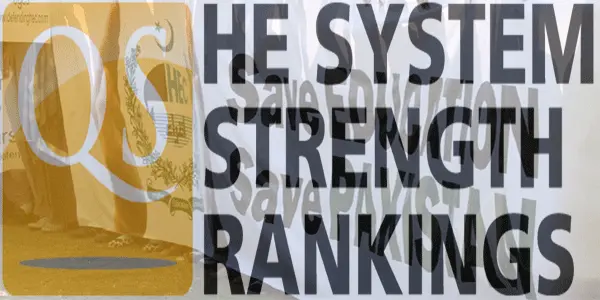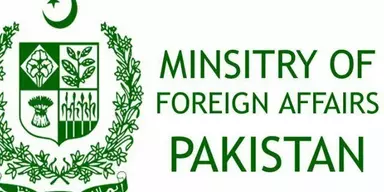The higher education system in Pakistan needs various improvements and developments. The higher education system of the country is mainly affected by the issues like quality of education, access to the overall higher education, relevance of studies and governance system.
Keeping in view the all parameters mentioned above QS Worldwide University Rankings has placed the Pakistan at the 50th position that is the last position in its recent publication of QS Higher Education System Strength Rankings 2016. The country is poorly performing regarding the system, access, flagship and economic. Overall ranking score of higher education system in Pakistan is 9.2. The countries with no proper higher education system are doing will than Pakistan. United Arab Emirates, Ukraine, Lebanon, Estonia, Kazakhstan, and Saudi Arabia are even at improved placed than Pakistan.
India is at 24 positions with the overall rank of 60.9. This year, seven European countries have made a top place on the list. While in Asia, China is at the top position with an overall score of 83.5 followed by South Korea and Japan with an overall score of 80.1 and 78.5 respectively.
The bad about the higher education system in Pakistan is that all failed in meeting the requirement of QS World University Rankings.
Check out score of Pakistan:
- System – 3.6
- Access – N/A
- Flagship – 1.7
- Economic – 31.1
- Overall Score – 9.2
| 1 | United States | 100 |
| 2 | United Kingdom | 98.5 |
| 3 | Germany | 94 |
| 4 | Australia | 92.6 |
| 5 | Canada | 90.2 |
| 6 | France | 89 |
| 7 | Netherlands | 84.8 |
| 8 | China | 83.5 |
| 9 | South Korea | 80.1 |
| 10 | Japan | 78.5 |
| 11 | Spain | 75.3 |
| 12 | Switzerland | 74.5 |
| 13 | Italy | 73.4 |
| 14 | Sweden | 73.1 |
| 15 | Belgium | 71.6 |
| 16 | New Zealand | 70.2 |
| 17 | Taiwan | 68.1 |
| 18 | Argentina | 67.6 |
| 19 | Finland | 66.9 |
| 20 | Hong Kong | 66.7 |
| 21 | Singapore | 62.3 |
| 22 | Brazil | 62.2 |
| 23 | Denmark | 62.1 |
| 24 | India | 60.9 |
| 25 | Ireland | 60.9 |
| 26 | Russia | 59.8 |
| 27 | Malaysia | 52.9 |
| 28 | Israel | 50.1 |
| 29 | Austria | 49.1 |
| 30 | South Africa | 47.1 |
| 31 | Chile | 46.7 |
| 32 | Norway | 46.6 |
| 33 | Mexico | 46.2 |
| 34 | Colombia | 40.9 |
| 35 | Portugal | 40.3 |
| 36 | Saudi Arabia | 36.5 |
| 37 | Thailand | 33.3 |
| 38 | Czech Republic | 31.8 |
| 39 | Turkey | 26.1 |
| 40 | Kazakhstan | 25.1 |
| 41 | Greece | 24.6 |
| 42 | Indonesia | 21.7 |
| 43 | Poland | 20 |
| 44 | Lebanon | 19.8 |
| 45 | Ukraine | 16.6 |
| 46 | Philippines | 16.4 |
| 47 | Egypt | 15.5 |
| 48 | United Arab Emirates | 10.9 |
| 49 | Estonia | 10.5 |
| 50 | Pakistan | 9.2 |
Since the data of independence of Pakistan, the higher education system of the country has been a matter of great concern among the educationists. Despite the fact that the number of colleges, universities and affiliated campuses are increasing in the country, the overall quality of higher education system is still at the lower end.
Some issues that are hindrance towards the better higher education system are:
Quality:
- Shortage of experienced faculty
- Low-quality education system with obsolete teaching and learning system
- Not much great effort on the quality assurance and internal evaluations of programs
Access:
- Access to higher education is considerably low
- Strength of girls is very low in the total enrollment
Relevance:
- The composition of new intakes as accentuated the weight of general studies, which have shown their student population increase by an average 25%. It may not respond to the needs of the labour market.
Governance:
- No parameters set of Higher Education Institutions accountability
- HEC NIL poor ranking methodology for annual ranking
- Universities own governance system is highly inefficient, administrative staff is under-qualified and not well trained.
- Skill gap within HEC and the concentration of power within a very thin leadership layer mean that a lot of work remains to be done to institutionalize reforms.















